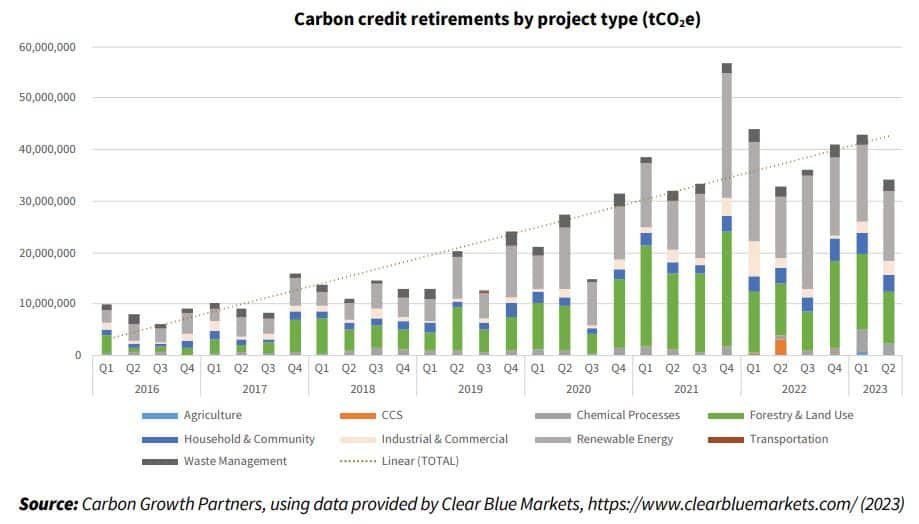At the upcoming UN climate talks, COP28, in Dubai next month, carbon credits will take center stage. These credits, bought by companies to offset their carbon emissions, allow them to consider consumed goods and services ‘carbon neutral’.
Carbon credits are from various projects that suck in or store carbon. These include anti-deforestation efforts, replacement of coal-fired power plants with renewables, and energy-efficient cookstoves.
Each credit signifies the reduction or removal of one tonne of CO2, allowing businesses to offset their CO2 footprint.
Carbon credits have grown since their integration into the 1997 Kyoto Protocol. However, their credibility faced substantial questioning this year following several scientific studies and investigative reports casted doubts on the voluntary carbon market (VCM), which operates independently of the UN process.
At the COP27 climate summit last year, the UN Secretary General expressed concerns about the lack of standards, regulations, and rigor in the VCM.
At this year’s COP28, talks will seek to clarify the complexities surrounding the participation of nations in carbon offset markets.
Renewing Credibility in Carbon Credit Market
The United Arab Emirates, COP28 host, expressed hopes for advancements during the Dubai summit to bolster credibility in carbon credit markets.
In a study focusing on averted deforestation, researchers concluded that emission reductions and project benefits were exaggerated. They also raised concerns about the lack of independence among project inspectors and the lenient practices of carbon credit certifiers such as Verra.
The research also highlighted the overflow of carbon offsets with minimal actual reductions achieved. While this study focuses on nature-based projects, many other carbon reduction initiatives exist as mentioned earlier.
At the 2023 Carbon Markets Summit in July, research firm Sylvera along with Pachama assembled a group of global leaders to delve into the present complexities and future potential of carbon markets. They produced a comprehensive report detailing the current state and future trajectory of this critical sector.
One of the findings revealed that carbon credits, through a last resort, do not mean later. The mitigation hierarchy does encourage reductions first over offsetting using carbon credits. But companies can buy them throughout their net zero journeys, so long that they don’t replace actual reductions.
More notably, corporations are moving upstream and become more involved earlier in projects, focusing on the ‘contribution’ approach over offsetting. It means they’re in a flight to quality to secure future supplies of high-quality credits. This trend will persist this year and beyond.
Declining Prices, Growing Market
Amid quality criticisms, the pricing of carbon credits for nature conservation projects witnessed a sharp decline. It plummeted from $18 dollars/tonne in January 2022 to $6 in January 2023, eventually dipping below $2 by mid-October.
Despite the dip in carbon prices, credit retirements remained strong in 2022 and on track to break records in 2023. As per report by Bloomberg with support from Carbon Growth Partners, there was an astounding 350% increase in annual retirements since 2016.


Carbon credit issuance peaked in >350 million in 2021 and slightly decreased in 2022 and 2023. Bloomberg projections indicate that the carbon credit market could go up to $8 billion by 2050.
More importantly, corporations are not the only entities relying on carbon credits to hit carbon neutral goals.
Article 6 of the Paris Agreement permits countries to collaborate in meeting emission reductions goals, including transferring carbon credits. This is also known as the “Internationally Transferable Mitigation Outcomes” or ITMOs.
This opens avenues for significant state investments in carbon credits, with developing nations relying on them for critical climate funding.
Oil-producing countries view them as a cost-effective means to achieve net zero emissions. Saudi Arabia is already unveiling a national offset scheme for corporations aligning with Article 6 of the Paris Agreement.
This matter is important in the lead up to COP28 when the Paris Agreement mandated the climate conference to deliver the first ever Global Stocktake – a comprehensive evaluation of the world’s progress against climate goals.
Keeping 1.5°C Within Reach
COP28 UAE will open a great opportunity for the world to come together and drive progress to keep 1.5C within reach.
During this critical event, the UAE will lead a process for all parties to come up with a clear roadmap. This pathway will fast-track progress toward global energy transition through inclusive climate action.
Taking place at Expo City in Dubai from November 30 to December 12, COP28 conference will convene >70,000 participants. They include heads of state, government officials, industry leaders, private sector, academics, experts, youth, and non-state actors.
And while the climate agenda involves several topics, talks about carbon credit markets will definitely be one of them.
The upcoming COP28 summit is poised to tackle critical concerns surrounding the fight against climate change. As discussions around carbon credit markets intensifies, the push for greater transparency and regulatory standards gains prominence. The convergence of global leaders and stakeholders at COP28 offers a good opportunity to discuss carbon credit concerns at the highest level.
- SEO Powered Content & PR Distribution. Get Amplified Today.
- PlatoData.Network Vertical Generative Ai. Empower Yourself. Access Here.
- PlatoAiStream. Web3 Intelligence. Knowledge Amplified. Access Here.
- PlatoESG. Carbon, CleanTech, Energy, Environment, Solar, Waste Management. Access Here.
- PlatoHealth. Biotech and Clinical Trials Intelligence. Access Here.
- Source: https://carboncredits.com/carbon-credits-to-take-center-stage-at-un-cop28-climate-talks/



